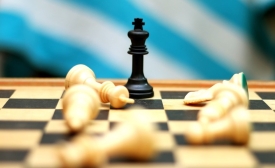russia
Russia has repeatedly proposed cooperation on cybersecurity to the US, but has not received a positive response, according to Putin. "We hear these endless and groundless accusations of some kind of interference, talking about cybersecurity. [...] Putin told the Arctic forum he sees positive changes in cooperation between Russia and the United States on Syria
An interview with Anne Applebaum about disinformation, soft power, and Russia.

Digital diplomacy involves more than simply social media, argues Shaun Riordan.
Putin perfectly understood the power of the media that helped propel his famously unpopular predecessor Boris Yeltsin into power in 1996. So the first thing he did after assuming the presidency in 2000 was to force all the major TV channels to submit to his will. Oligarch owners were either co-opted, jailed or exiled, and by 2006 most major Russian media were either directly or indirectly under Putin’s administration’s control.
RT’s coverage may seem shoddy, at times even comical, but it serves its propaganda function efficiently. Media failures over the Iraq War and the financial crisis have disenchanted audiences, making them cynical and distrustful. The cynicism, however, has made them credulous toward those who present themselves as critics of the “mainstream media”...
A South Korean non-governmental organization said Monday that it will launch a youth team in Ukraine this week to step up promotion of South Korea and its policy and culture in the European region. The digital public diplomacy team will be comprised of 100 local and Korean students. Its launch ceremony will be held at a university in Kiev, Ukraine on Friday, according to the Voluntary Agency Network of Korea.
Ankara and Moscow are doing a diplomatic two step together. Conspicuously left out in the cold in this dancing duo, are two major power blocks which traditionally Turkey considers vital to its security needs: The United States and the European Union. The meetings between the Russian President Putin and his Turkish counterpart indicates a willingness on both sides to further consolidate economic, diplomatic and most importantly, and no doubt, also military ties.







